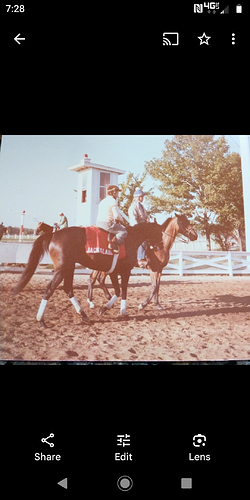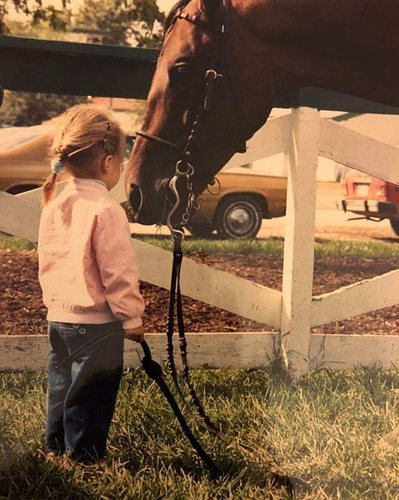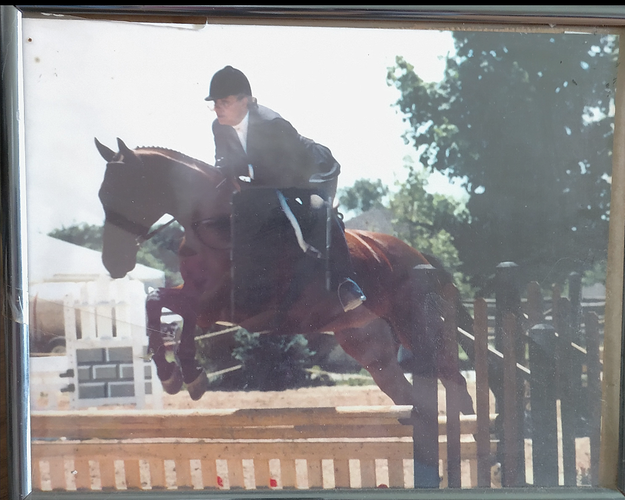I was talking to some people this weekend and we were discussing some really exceptional OTTBs that we know. The ones that came off the track with great brains, very amateur friendly, didn’t need much time to adjust to their new careers and were just lovely horses.
We wondered what played the biggest role in them turning out that way. Is it bloodlines/genetics? The care and early training they got on the breeding farm? Their trainers on the track? Or is it just that individual horses personality?
All of the above. The TB is has been bred for centuries to be a highly domesticated creature. Bad temperament might be forgiven in an exceptional stallion but in the rest of the herd there is active selection against breeding bad actors. They must be trainable. From the time they are born at their specialist farms to the time they finish their track career, they are handled by people who are skilled and knowledgeable and want the best for them - to make them winners - so they should arrive off the track with manners and skills largely installed. The process of training is demanding so a sound mind, sound body and generous nature is necessary to be a racehorse. The less robust or the really slow are unlikely to stay in training and hopefully the rubbish racehorses leave the track early before they suffer for their inadequacies, so they can shine in their new role. Most TB mares go to the breeding paddocks so it means most OTTB are geldings which helps them concentrate! The one thing with a TB, they haven’t got the survival instincts and the ability to take care of themselves that cobs and ponies have in spades.
I saw a beautiful mare recently but something bad had happened to her in the mysterious six months between leaving racing and being purchased at a public auction to become a show horse. She desperately wanted to make human contact but she had lost her trust in humans.
I think the two biggest factors are soundness and competent rider/trainers.
2 Words:
Storm Cat
His get we’re known for rotten temperaments.
But they could run, so…
ETA(from a Racing mag article:
"Another interesting example of sires “passing on” their temperamental quirks can be seen in the Storm Bird male line. Storm Bird himself was a notoriously mean stallion, and his son, Storm Cat, himself has a number of stallions, such as Catrail and the self mutilator Tale of The Cat, with troublesome personalities. Another Storm Cat son, Storm Boot – a successful sire from limited opportunities in the US, was also described as an “unusually aggressive stallion.”
Having said that, two sons of Storm Cat, who are reputed to be relatively sensible stallions are Giant’s Causeway and the late, Hennessy."
My own TB - bred from a local stallion with racing cred - failed to have the speed needed.
So he never got registered w/Jockey Club (no tattoo), but ponied for the husband/wife trainers until I bought him as a 6yo.
Here he is ponying at the Arlington Million:
He had a relatively* sweet nature. Never a cuddler, but was good with kids
*could have “Track Manners” on the ground, never U/S
With trainers’ kid:
When their string was in KY, they entered him in a local H/J show. He took Pregreen Champ.
Then did what he was good at for me for the next 20yrs:
Usually all of the above, but they tend to be resilient enough that you can get by with deficits in a couple of those areas.
I have the most lovely young TB. He’s an up for anything, athletic, playful kid who loves to show off what he has learned and is just a blast to work with.
If buyers consistently insist that OTTBs “MUST HAVE CLEAN LEGS!” rather than selecting horses with the best brains who simply need a few months off in a field for something to heal, they’re being short sighted. Ideally, you have the total package from day one, of course.
My guy was beautifully bred. Until the final month of his racing career when he wound up at a terrible track, he had breeders and owners who are good people who still follow up with him. He was put right into a great OTTB retraining program for several months where he got the right foundation with people who do nothing but prepare racehorses for new careers. He went directly into a program with a great trainer who loves thoroughbreds.
The last point was important -for us at least. When I was preparing to bring him home, I was surprised by how many trainers I spoke to who had extreme negative opinions of thoroughbreds. If I had wound up at one of those barns, I suspect that I could have been pressured to sell him, or I would have repeatedly relocated him because of trainers who didn’t know how to work with a sensitive horse. They’re usually smart and sensitive. They usually like a back and forth engagement in training -not to be treated like robots.
Attitude, and finding a job they love.
Bought an unraced ,race bred horse. The rest of the siblings ran and won, this one didn’t want to run. That is until started over jumps. Loved it, once he found out there was another jump after this one, no problem.
Their connections during their racing career, IMO.
I’ve had a mix of different TBs, all from different connections of varying quality (or lack thereof). I cannot stress how much easier it is to restart (and campaign down the line) a horse who has never had a bad day.
I’m going to say the horse themselves.
A good horse will overcome most everything else.
I’m going with the first two. They have to have been born with a good temperament, and after that, the quality of the training and care they receive.
I agree with all of the above, really. But this stands out. My late DH was a former steeplechase jockey turned show jumper from Europe. He was also a DVM. We bought horses off the track for years, restarted them, and sold them into new careers. Some came from good track backgrounds and some came from horrible connections. We once bought a 17.3H gelding who was handled by two large men on either side of him, both w lead shanks w chains. He was a monster at the track but in the right hands, went on to be a very successful hunter, and then dressage horse. To me, a trainer’s ability to assess a horse’s talents, true disposition, and how to best bring a horse along is paramount. They are all individuals and need to be treated as such, at least to me.
So if I wanted to get another OTTB as awesome as the horse I currently have, do I look for one with the same sire? Dam line? Or from the same breeder? Or track connections? 
I’m pretty sure I have a unicorn and because I’m obsessed with him, probably no horse could ever hold a candle to him, but if I DID want to find another one, I would need a starting place I guess.
My observation over time is that so much bad behaviour is from chronic pain, so I’d say being totally pain free is thing #1. Even a sweet quiet horse can start bucking with pain. So ulcers, back, legs, feet. Obviously soundness correlates to quality of previous care but also accidents do happen too.
Perfectly said, and much better than I could. This is what I mean by the quality of connections. Racing is hard on them and a little pain is natural as part of conditioning and strength/remodeling - but how they maintain and take care of the horse as he heals/recovers impacts their future.
Mine loved jumping too
I often say if he’d had a trainer that had steeplechasers, I may never have gotten my hands on him
Biggest factor is the quality of the racing circuit and quality of trainers and handlers. The higher end tracks and quality of trainers are a big factor - they train and take the time to teach ground manners and life skills and don’t short cut ground manners training with drugs or companion horse. There are are some great horses that are very sound after racing for 4 years plus - but there is emotional baggage that is the biggest training hurdle sometimes.



